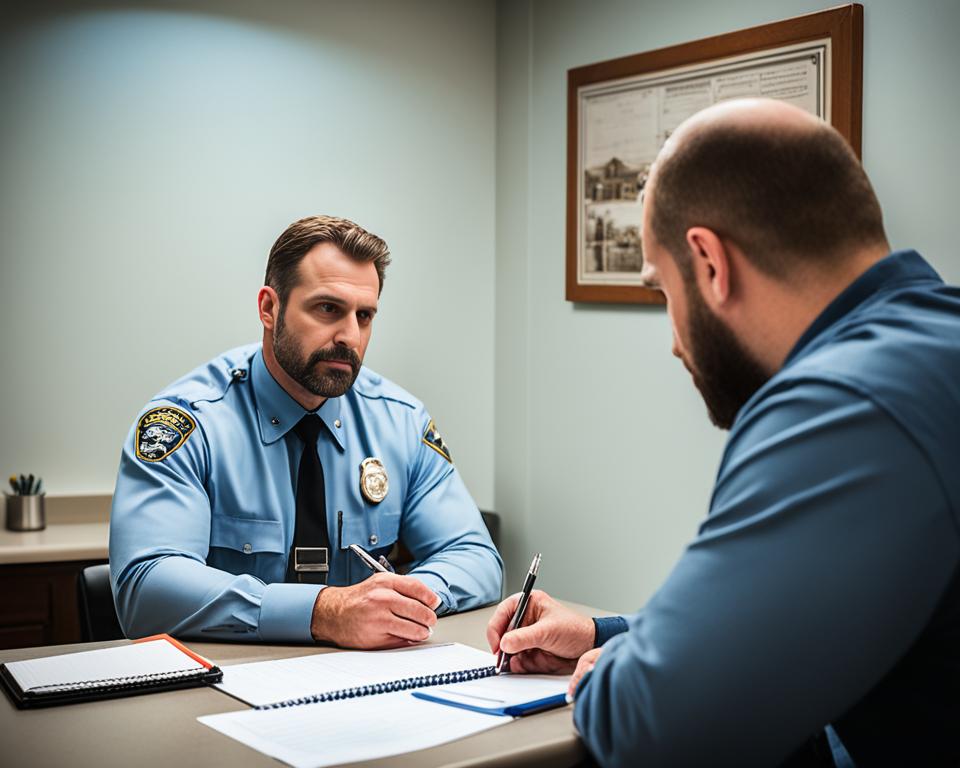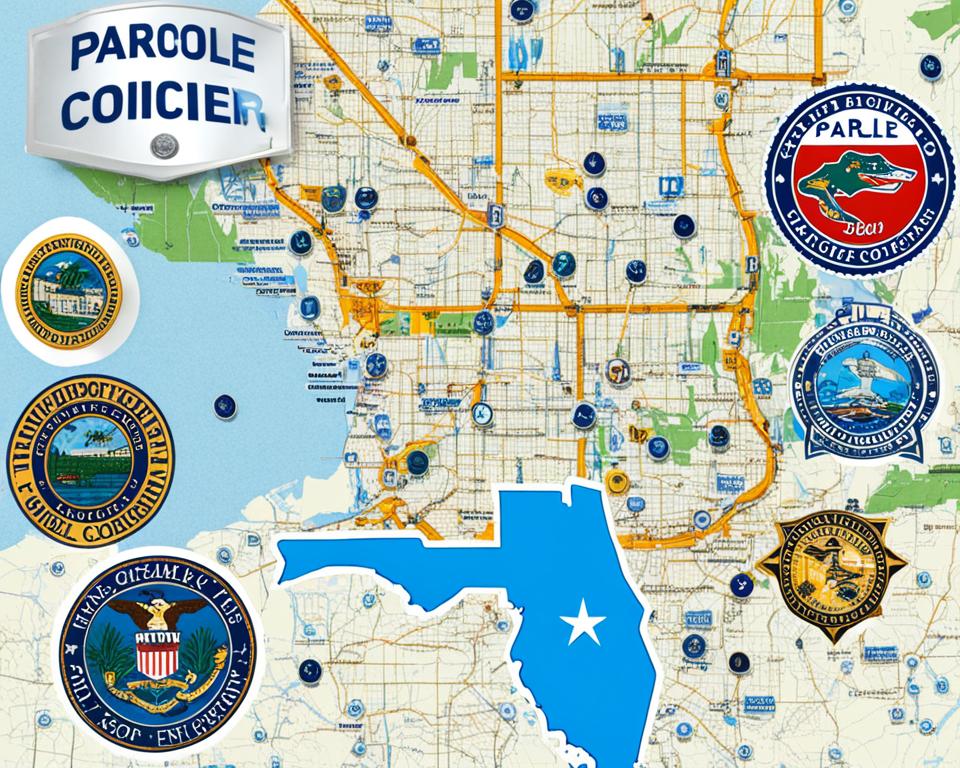Have you ever wondered what it takes to oversee one of the largest populations of correctional professionals in the United States? Becoming a parole officer in Florida isn’t just about fulfilling a job requirement—it’s about meeting the challenges and responsibilities of supervising offenders within the community. How does one embark on this rewarding career path?
The Florida Department of Corrections, an equal opportunity employer with a preference for hiring veterans and their spouses as per Chapter 295 of the Florida Statutes, is on the lookout for dedicated individuals. These future parole officers will join a network that includes 131 Probation and Parole Field Service locations across the state, offering a broad spectrum of professional opportunities.
When you begin a career in this field, you commit to contributing significantly to public safety while affecting positive change in the lives of offenders. As a new parole officer, you not only look forward to competitive salaries, ranging from $33,478 to $51,603, but also the potential for annual bonuses, reported to be $2,740 in specific counties. The impact of parole officers goes beyond supervision—they also play a crucial role in collecting nearly $72 million in fines, victim restitution, and fees each year.
With over 4,700 probation and parole officer jobs reported in Florida as of 2010, and an impressive number of 145,849 offenders under the supervision of the Florida Department of Corrections as of June 30, 2012, the demand for skilled professionals in this sector is undeniable. Successfully guiding offenders as they complete almost 1.5 million hours of community service annually, about 45 percent of supervised individuals manage to complete parole or probation successfully. However, the job also entails handling the complexities of revocations due to new arrests (15 percent) or technical violations (23 percent).
Curious about what it takes to join these ranks? Let’s break down the Florida parole officer qualifications and the steps to become a certified parole officer. From educational requirements to background checks and training programs, this career path demands commitment and a strong moral character.
Understanding the Role of a Parole Officer in Florida
If you’re thinking about how to become a parole officer in Florida, it’s helpful to know what the job entails. Florida’s parole officers provide essential services like pretrial intervention, electronic monitoring, and various types of supervised probation. They’re crucial in the justice system, aiding offenders in reintegrating into society while keeping communities safe.

Job Duties and Responsibilities
The parole officer job duties in Florida are varied and impactful. You’d be responsible for monitoring offenders, ensuring they comply with parole conditions. This includes coordinating community service, collecting fines, victim restitution, and fees. You could find yourself helping offenders adjust to life post-incarceration, aiming to reduce reoffending rates.
Work Environment and Locations
As a parole officer, you’ll work in diverse environments. The Florida Department of Corrections has 131 Probation and Parole Field Services offices spread across the state. You might operate in urban areas or rural communities, adapting to many settings to meet parolees where they live.
The commitment to community safety isn’t just about meeting people—it’s hands-on work that impacts lives. Imagine being part of a team that supervised 145,849 offenders by June 30, 2012. That’s a testament to the breadth of influence parole officers have in Florida.
Obtaining probation officer certification in Florida means you’ll be equipped to handle these responsibilities effectively. This certification is a step towards ensuring you’re prepared to educate, manage, and support offenders in your care.
Considering how to become a parole officer in Florida? Understand that you’ll play a critical role in the broader criminal justice system, significantly impacting offenders’ reintegration into society and contributing to a safer community for everyone.
Parole Officer Requirements in Florida
Becoming a parole officer in Florida requires meeting specific criteria established by the Florida Department of Corrections. These requirements ensure that only candidates with the right qualifications, temperament, and background are hired to supervise offenders.

Educational Qualifications
To begin with, one must possess a bachelor’s degree. This educational foundation is crucial since parole officers handle complex duties, requiring analytical and communication skills that are typically honed through higher education.
Age and Citizenship Criteria
Aspiring parole officers must also meet specific age and citizenship requirements. You need to be at least 19 years old and a U.S. citizen. This ensures that applicants are mature and have a strong commitment to serving the country.
Background and Character Standards
A critical aspect of the hiring process involves background and character checks. The Florida Department of Corrections careers emphasizes the need for integrity. Thus, any felony conviction, or a misdemeanor involving perjury, disqualifies a candidate. Moreover, candidates must successfully pass a rigorous background investigation, including fingerprinting, drug tests, and a thorough physical examination to confirm their suitability for the role.
Meeting these parole officer requirements in Florida ensures that individuals are well-prepared to take on the duties and responsibilities that come with the job. With a competitive salary ranging from $33,478 to $51,603 and additional annual bonuses in specific counties, this role offers both financial and personal rewards for dedicated individuals.
Florida Department of Corrections Careers
If you’re considering a career with the Florida Department of Corrections, you’re looking at a meaningful path that combines public service with personal growth. Being a parole officer offers a sense of purpose, and the department places a significant emphasis on education and professional development.
One key imperative in Florida Department of Corrections careers is meeting the Florida parole officer qualifications. These include having a minimum age of 19 for law enforcement roles and 18 for corrections officers, U.S. citizenship, and possessing at least a high school diploma or equivalent for correctional roles, while correctional probation officers need a bachelor’s degree. The department places high value on good moral character, requiring no prior felony or misdemeanor convictions involving perjury or false statements.
The steps to becoming a parole officer are thorough, ensuring that only qualified, dedicated individuals are entrusted with this critical role. This process includes passing a State Officer Certification Examination after completing the Florida Basic Recruit Training Program. Additionally, officers must undergo extensive background checks and meet physical fitness standards. The fingerprinting is processed by the FDLE and FBI, and a comprehensive background investigation, including drug testing, is conducted.
In return, Florida Department of Corrections careers offer a competitive salary, with starting salaries ranging from $33,478 to $51,603. There are annual bonuses for those in high-living-cost counties and numerous benefits like paid vacation, health insurance, and retirement plans. Professional growth is encouraged through continuous training and educational opportunities.
Plus, those committed to public service will find it gratifying to be part of a system that significantly impacts community safety and offender rehabilitation. Parole officers help collect millions in fines and restitution, monitor thousands of hours of community service, and ensure that offenders comply with their parole conditions.
Are you ready to explore a meaningful career? The Florida Department of Corrections Statewide Recruitment Center is ready to assist you with every step of the application process. So why wait? Take the first step toward a rewarding career that makes a difference.
Steps to Become a Parole Officer
Embarking on the journey to become a parole officer is rewarding and involves several important steps. Let’s break down these steps to give you a clear path forward.
Application Process
The first step in the process is the application itself. You’ll need to submit your application along with supporting documents. Florida parole officer qualifications include being at least 19 years old, having a high school diploma or GED (though a bachelor’s degree is required for correctional probation officers), and holding U.S. citizenship. Make sure to gather your college transcripts, resume, and any military service documents that might apply to you.
Required Documentation
Completing the application process requires substantial documentation. This includes recommendations from past employers, criminal history disclosures, and other personal information that ensures transparency. Keep in mind that strong character references are crucial, especially considering the rigorous background checks that come next.
Medical and Background Evaluation
Your next hurdle is passing the medical and physical fitness evaluations, which are mandatory. These are critical given the demands of the job. The Florida Department of Corrections sets high standards for physical health and ethical behavior. Background checks, including fingerprints processed by the FDLE and FBI, aim to verify your history and moral character, ensuring you can responsibly handle the duties of a parole officer.
If you meet these initial standards, the next phase involves attending the Florida Basic Recruit Training Program, completing the State Officer Certification Examination, and ultimately adhering to ongoing educational requirements. This rigorous training is fundamental to the parole officer training in Florida, making sure you’re well-prepared for the responsibilities that lie ahead.
By following these steps to become a parole officer, you’ll join a committed workforce dedicated to public safety and offender rehabilitation, making an impact in communities across Florida.
Parole Officer Training in Florida
Embarking on a career as a parole officer in Florida involves comprehensive training and ongoing education. Let’s explore what this training journey entails.
Basic Recruit Training Course
The foundation of parole officer training in Florida is the Basic Recruit Training Course. This rigorous program encompasses 640 hours of instruction. You’ll learn defensive tactics, legal issues, first aid, and firearms handling. The completion of this course ensures that you are well-prepared to face the challenges of supervising offenders effectively.
State Officer Certification Examination
Upon completing the Basic Recruit Training Course, the next step is passing the State Officer Certification Examination. This exam is a significant milestone, testing your knowledge and readiness. Successful passage of this examination is crucial for obtaining probation officer certification in Florida, solidifying your capability to uphold the law and ensure public safety.
Continuing Education and Annual Training
Training doesn’t stop once you become a certified parole officer. Continuous professional development is vital. Every year, officers must undertake additional training to stay updated on new laws, techniques, and best practices. This commitment to ongoing education highlights the dedication to excellence and effectiveness required in the role of a parole officer in Florida.
Remember, a career in this field means you are never truly done learning; there’s always room for growth and improvement through parole officer training in Florida.
How to Become a Parole Officer in Florida: Certification and Exams
Becoming a certified parole officer in Florida is an exciting journey filled with specific steps and tests. Each stage ensures candidates are well-prepared for the responsibilities and challenges of the role.
One of the main requirements is passing the Basic Abilities Test. This test assesses your intellectual skills and readiness for the job.
Basic Abilities Test
To start with, you must excel in the Basic Abilities Test. This isn’t just a formality—it’s a measure of whether you have the core skills necessary to succeed in this demanding role. Candidates must demonstrate cognitive abilities that align with the job’s requirements.
Physical Examination
Next up is the physical examination. As part of how to become a parole officer in Florida, applicants must pass a thorough physical evaluation. This ensures that potential officers are physically capable of handling the job’s rigors.
Once you’ve cleared these hurdles, the final step is the State Officer Certification Examination. Passing this exam is crucial for becoming a certified parole officer, as it demonstrates your knowledge and readiness to uphold Florida’s standards.
Joining the ranks of over 4,700 probation and parole officers in Florida is no easy feat, but with commitment and preparation, it’s entirely achievable. The certification process is designed to ensure only the best and most capable individuals become parole officers, ready to make a significant impact in their communities.
Florida Parole Officer Salaries and Benefits
When exploring a career as a parole officer in Florida, it’s important to consider the financial aspects and added perks of the job. Florida parole officer salaries and benefits reflect the critical nature of their work in the criminal justice system. Let’s dive into the specifics.
Salary Ranges
The typical salary range for parole officers in Florida is between $33,478 and $51,603 per year. These figures can vary significantly based on a variety of factors such as location, experience level, and specific employer. For example, correctional probation officers earn about $22 per hour. Additionally, those assigned to certain high-cost-of-living counties may receive a salary additive ranging from approximately $1,700 to $7,739.88 annually, further enhancing their compensation.
Bonuses and Additional Benefits
Beyond the base salary, Florida parole officers enjoy several other benefits. These benefits include paid vacation, sick leave, and holidays which offer significant work-life balance. Comprehensive health insurance is also part of the package, alongside life insurance, supplemental dental, vision, disability, and hospitalization insurance. Plus, officers have access to tuition-free college courses, a 457 Tax Deferred Retirement Plan, and the Criminal Justice Incentivized Pay Program. Flexible schedules add another positive dimension to the role, making it a highly attractive career choice.
Veterans’ Preference is available for eligible candidates, providing them an edge in employment for Career Service vacancies. The Florida Department of Corrections understands the value of experienced and skilled individuals, and this policy supports those who have served the country.
By providing competitive Florida parole officer salaries and benefits, the state not only acknowledges the challenging nature of the job but also actively encourages a stable and committed workforce dedicated to public safety and offender rehabilitation.
What Skills Do Travel Agents and Parole Officers in Florida Have in Common?
Travel agents and parole officers in Florida excel in communication, problem-solving, and attention to detail. Both careers demand strong interpersonal skills and adaptability to meet client needs. If you wish to embark on a career centered around organization and service, you can become a travel agent florida and utilize similar skill sets effectively.
Conclusion
Embarking on the steps to become a parole officer in Florida offers a rewarding path dedicated to public service. With clear requirements such as being at least 19 years old, having high school graduation or its equivalent, and holding no felony convictions, the path might seem rigorous but truly attainable. Meeting these criteria ensures you are ready to maintain the high standards set for Florida probation officer certification.
This profession sees a rich history and evolution, with over 630,000 correctional personnel reported back in 2001, about 60% involved in probation and parole. A significant point is the training received; from passing a physical exam to completing a Commission-approved course of basic recruit training, which underscores the profound preparation required. Continuous emphasis on professional growth through additional education, such as the valuable training in cultural diversity, shapes officers ready for today’s diverse challenges.
In summary, the journey to becoming a parole officer in Florida embodies commitment and professionalism. Offering a competitive salary ranging from entry-level positions at $23,000 to top positions close to $93,400 in 2005, the financial benefits are noteworthy. More importantly, it provides an avenue to contribute significantly to community safety and offender rehabilitation. The realization that every effort contributes to a disciplined and secure environment makes this career not just a job, but a true calling.

